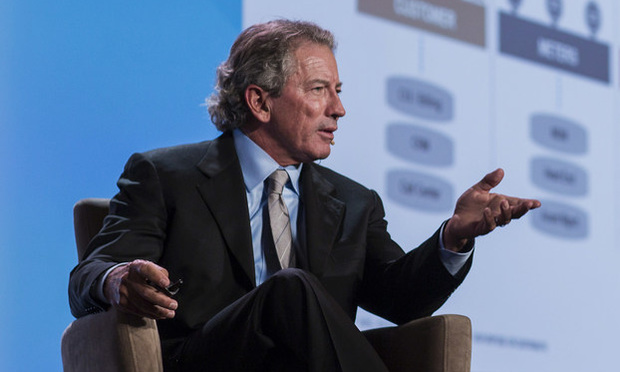With Jury Verdict, Tech Billionaire Siebel's Years-Long Fight With a Former Salesman Nears an End
After a contentious and lengthy legal battle involving multiple law firms, a jury found that Thomas Siebel's C3 IoT did not owe former salesman Gregg Carman additional pay.
July 27, 2018 at 06:00 PM
4 minute read
 Thomas Siebel. Photo Credit: F. Carter Smith/Bloomberg LP
Thomas Siebel. Photo Credit: F. Carter Smith/Bloomberg LP
A grinding four-year worker lawsuit against the company led by tech billionaire Thomas Siebel has come a step closer to conclusion, with a San Jose jury this week delivering a verdict against a former salesman for C3 IoT who claimed that Siebel shortchanged him on commissions.
C3 IoT, an industry-facing internet of things company, convinced a majority of the jury that former salesman Gregg Carman did not have a reasonable expectation of being paid several hundred thousand dollars extra in commissions—defeating his claim under a legal theory known as “quantum meruit.” C3 is represented by Quinn Emanuel Urquhart & Sullivan.
But the jury also unanimously rejected C3's counterclaims against Carman, which alleged that the Massachusetts-based former employee misrepresented the nature of deals with two utility companies that he had closed, and actually owed C3 roughly $120,000.
The jury agreed that Carman had been fired for either complaining about his compensation or to avoid paying him additional commissions, but did not find that he had been wrongfully terminated under California law. Carman is represented by David Lowe of San Francisco employment firm Rudy, Exelrod, Zieff & Lowe.
The verdict brings the long-simmering dispute near to an end. Where many companies might have quickly settled a small-dollar suit like Carman's—which was filed after Siebel refused to pay the salesman his suggested compromise amount of $360,000—C3 fought the case vigorously, using four different major law firms over the course of the years-long case.
Siebel, a former Oracle executive, has a record of litigating aggressively in his defense. After fending off a wrongful termination suit in the 1990s, he pursued a malicious prosecution claim against the lawyer on the case, who later became a California state court judge. That decade-long saga only resolved after she publicly apologized and agreed to pay a $100,000 settlement.
“Tom is a very principled guy. And for Tom, it really wasn't about the money,” said Quinn Emanuel partner John Potter, who led the trial for C3. “For Tom it was about the principle. And if someone is going to assert an illegitimate claim for compensation, Tom is not going to settle it.”
C3 faced a challenging case, though. Carman stood to be paid over $1 million in commissions under a fiscal year 2014 company policy. He actually closed the deals with the utility companies in FY 2015. But he was not informed of the FY 2015 policies—which would leave him with about a quarter of what he would have received earlier—until after the deals closed.
The defense hinged on C3 convincing the jury that such policy changes, and their retroactivity, are standard practice in the industry and that Carman was an experienced enough salesman to have understood that. “He had an awareness of how the industry operates, and … his payment was consistent with how the industry operates,” Potter said in an interview.
C3 potentially faced around $8 million in damages and attorney fees at trial, due in part to the fact that wrongful termination damages are trebled under California law.
Although Carman's main case against C3 was defeated, Lowe said in an interview Friday that he still saw a victory in fending off the counterclaims brought by the company.
“It's part of a pattern that we've seen increasingly in employment cases, where defendants become aggressive when they're challenged over compensation,” he said. “I really do believe that as plaintiffs lawyers, we have to fight these counterclaims and we have to win them.”
As for whether he planned to appeal the verdict, Lowe said he and his client are still assessing the path forward. “I think both sides have some decisions to make,” Lowe said.
The jury verdict was delivered after a day of deliberations on Wednesday, following a week-and-a-half-long trial in the courtroom of Santa Clara Superior Court Judge Sunil Kulkarni.
This content has been archived. It is available through our partners, LexisNexis® and Bloomberg Law.
To view this content, please continue to their sites.
Not a Lexis Subscriber?
Subscribe Now
Not a Bloomberg Law Subscriber?
Subscribe Now
NOT FOR REPRINT
© 2025 ALM Global, LLC, All Rights Reserved. Request academic re-use from www.copyright.com. All other uses, submit a request to [email protected]. For more information visit Asset & Logo Licensing.
You Might Like
View All
Pistachio Giant Wonderful Files Trademark Suit Against Canadian Maker of Wonderspread
4 minute read
Hogan Lovells, Jenner & Block Challenge Trump EOs Impacting Gender-Affirming Care
3 minute read
Gen AI Legal Contract Startup Ivo Announces $16 Million Series A Funding Round

PayPal Faces New Round of Claims; This Time Alleging Its 'Honey' Browser Extension Cheated Consumers
Trending Stories
Who Got The Work
J. Brugh Lower of Gibbons has entered an appearance for industrial equipment supplier Devco Corporation in a pending trademark infringement lawsuit. The suit, accusing the defendant of selling knock-off Graco products, was filed Dec. 18 in New Jersey District Court by Rivkin Radler on behalf of Graco Inc. and Graco Minnesota. The case, assigned to U.S. District Judge Zahid N. Quraishi, is 3:24-cv-11294, Graco Inc. et al v. Devco Corporation.
Who Got The Work
Rebecca Maller-Stein and Kent A. Yalowitz of Arnold & Porter Kaye Scholer have entered their appearances for Hanaco Venture Capital and its executives, Lior Prosor and David Frankel, in a pending securities lawsuit. The action, filed on Dec. 24 in New York Southern District Court by Zell, Aron & Co. on behalf of Goldeneye Advisors, accuses the defendants of negligently and fraudulently managing the plaintiff's $1 million investment. The case, assigned to U.S. District Judge Vernon S. Broderick, is 1:24-cv-09918, Goldeneye Advisors, LLC v. Hanaco Venture Capital, Ltd. et al.
Who Got The Work
Attorneys from A&O Shearman has stepped in as defense counsel for Toronto-Dominion Bank and other defendants in a pending securities class action. The suit, filed Dec. 11 in New York Southern District Court by Bleichmar Fonti & Auld, accuses the defendants of concealing the bank's 'pervasive' deficiencies in regards to its compliance with the Bank Secrecy Act and the quality of its anti-money laundering controls. The case, assigned to U.S. District Judge Arun Subramanian, is 1:24-cv-09445, Gonzalez v. The Toronto-Dominion Bank et al.
Who Got The Work
Crown Castle International, a Pennsylvania company providing shared communications infrastructure, has turned to Luke D. Wolf of Gordon Rees Scully Mansukhani to fend off a pending breach-of-contract lawsuit. The court action, filed Nov. 25 in Michigan Eastern District Court by Hooper Hathaway PC on behalf of The Town Residences LLC, accuses Crown Castle of failing to transfer approximately $30,000 in utility payments from T-Mobile in breach of a roof-top lease and assignment agreement. The case, assigned to U.S. District Judge Susan K. Declercq, is 2:24-cv-13131, The Town Residences LLC v. T-Mobile US, Inc. et al.
Who Got The Work
Wilfred P. Coronato and Daniel M. Schwartz of McCarter & English have stepped in as defense counsel to Electrolux Home Products Inc. in a pending product liability lawsuit. The court action, filed Nov. 26 in New York Eastern District Court by Poulos Lopiccolo PC and Nagel Rice LLP on behalf of David Stern, alleges that the defendant's refrigerators’ drawers and shelving repeatedly break and fall apart within months after purchase. The case, assigned to U.S. District Judge Joan M. Azrack, is 2:24-cv-08204, Stern v. Electrolux Home Products, Inc.
Featured Firms
Law Offices of Gary Martin Hays & Associates, P.C.
(470) 294-1674
Law Offices of Mark E. Salomone
(857) 444-6468
Smith & Hassler
(713) 739-1250






